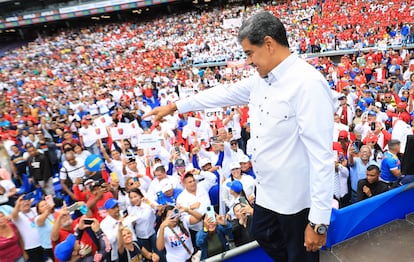Chavismo confident of a comeback in the final stretch of the presidential election campaign
The ruling party commissioned an ‘anthropological study’ that reveals Nicolás Maduro is perceived as the ‘strong’ candidate, while Edmundo González Urrutia represents the ‘weak’ option


A month ago, the hardcore of Chavismo received some alarming polls. The opposition candidate, Edmundo González Urrutia, had in a few weeks gone from being a true unknown to surpassing the current president, Nicolás Maduro, in voting intentions. Maduro, his political operator Jorge Rodríguez, and the party’s vice-president Diosdado Cabello, found themselves in an unexpected situation of precariousness. The three, in charge of the government’s campaign, were forced to row upstream. The same data fell into the hands of Colombian President Gustavo Petro and his counterpart in Brazil, Lula Da Silva, who thought that perhaps it was time to lay the foundations for an orderly transition, a change of political cycle, and a return to democracy after 25 years of Chavismo.
However, Maduro and his followers have shown no signs of intending to leave power. Firstly, because they consider this to be a “denied assumption.” The term is now heard at all Chavista political gatherings. Although one word cancels out the other, it means Urrutia’s victory is an impossibility, something that cannot happen under any circumstances. The existence of such a scenario is denied. Moreover, it is rare to hear the Chavista leaders consulted by EL PAÍS pronounce the name of the rival candidate. It is simply not in the equation. Secondly, because Chavismo is still confident of its capacity to mobilize support, despite reliable polls placing it far behind the opposition.
In the Miraflores Palace, the seat of government, distrust is rife. Any matter emanating from overseas is considered a danger, a threat. Polls carried out by private companies, they believe, are manipulated. The world, in general, is conspiring against Chavismo. This is the general thesis. But, according to a leader of the ruling United Socialist Party of Venezuela (PSUV), there is an internal poll that places Urrutia ahead by 14 points. At this point, 10 days before the elections, anyone would think that this is too big a burden, an insurmountable gap. Not for Maduro, Rodríguez and Cabello who, according to the same source, believe that in this long week they will turn the result around, assuming elections that are fair and competitive for the opposition are finally held. “Our campaign is touching the people. Edmundo’s campaign isn’t anymore; it has reached its ceiling. We are moving forward, and the gap is narrowing,” they state with confidence.
This Chavista optimism is based on an “anthropological study” that has revealed the characteristics of the candidates in the eyes of Venezuelans. According to this undisclosed document, people perceive Maduro as “the strong one,” while they see Urrutia as the “weak one.” The president has made continuous references to his opponent’s age — 74 — to discredit him. Chavismo also thinks that it works in their favor that the same debate has been opened around U.S. President Joe Biden; they consider that this parallelism arises naturally.
The softer sectors of the ruling party speak of a democratic victory, or of an assumption of defeat if the ballot boxes so dictate. For the hardliners the Bolivarian revolution, which has turned into the conformation of an authoritarian regime, must continue at any cost. In their opinion, Maduro has done “very well,” according to a Chavista diplomat consulted. That is the opinion of the Maduristas, defenders of a president that people, in general, consider inferior to Hugo Chávez, the ideologue. Maduristas do not view the president that way; they praise him as the person who prevented the country from “going off the cliff.” According to their thesis, Maduro inherited a country in free-fall due to Chávez’s poor financial decisions, and now his mythical status covers his mistakes like a cloak. Despite sanctions, the nation “did not sink” — in seven years, Venezuela lost 80% of its GDP, according to the IMF. “We have already gone back up the slope. The worst crises were overcome. And relations with the U.S. will surely be restored,” adds this source.
The polls, however, are devastating for Chavista interests. According to a study by the Center for Political and Government Studies of the Andrés Bello Catholic University (CEPyG-UCAB) and the pollster Delphos, Urrutia would win with 59.1% of voter intention. Maduro would remain at 25%, a figure he has risen to from the 19% with which he started the campaign. This is the momentum that the Chavista hardcore believes will not stop there, and that will catapult them ahead in the final week. Although many view it as impossible at this stage, they remain convinced of victory by electoral means.
Sign up for our weekly newsletter to get more English-language news coverage from EL PAÍS USA Edition
Tu suscripción se está usando en otro dispositivo
¿Quieres añadir otro usuario a tu suscripción?
Si continúas leyendo en este dispositivo, no se podrá leer en el otro.
FlechaTu suscripción se está usando en otro dispositivo y solo puedes acceder a EL PAÍS desde un dispositivo a la vez.
Si quieres compartir tu cuenta, cambia tu suscripción a la modalidad Premium, así podrás añadir otro usuario. Cada uno accederá con su propia cuenta de email, lo que os permitirá personalizar vuestra experiencia en EL PAÍS.
¿Tienes una suscripción de empresa? Accede aquí para contratar más cuentas.
En el caso de no saber quién está usando tu cuenta, te recomendamos cambiar tu contraseña aquí.
Si decides continuar compartiendo tu cuenta, este mensaje se mostrará en tu dispositivo y en el de la otra persona que está usando tu cuenta de forma indefinida, afectando a tu experiencia de lectura. Puedes consultar aquí los términos y condiciones de la suscripción digital.








































